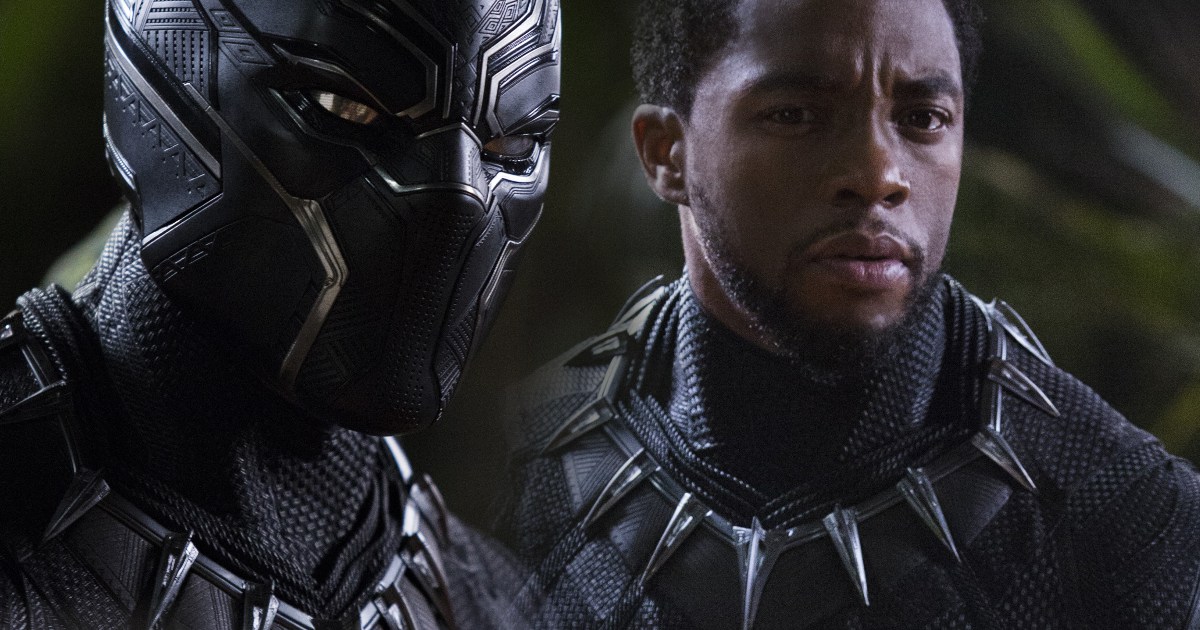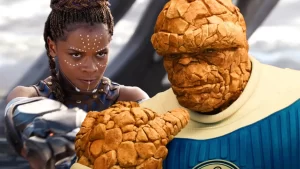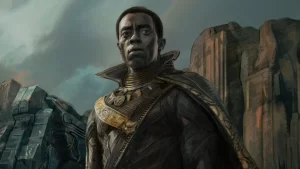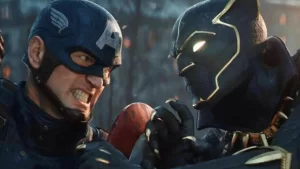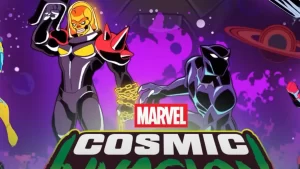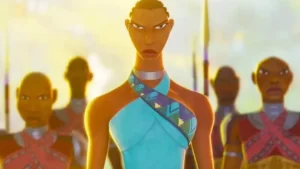Progress
A Film Review of Black Panther
Hollywood is a highly profitable industry which, like every other, has been exploited and controlled by a select cross section of people. The demand for increased diversity in Hollywood within the industry stems from more than just people of color wanting to make bigger Hollywood money; although it would be wrong to dismiss this motive from being relevant to the conversation. Besides the opportunity for greater profit by an individual or even as groups of individuals, Hollywood films represent the most powerful projections of American culture, both good and bad, to the rest of the world. It may not execute this function in the most accurate or responsible way, but the Hollywood spectacle affords the filmmaker a unique prospect to say and show something that the world will recognize. Increased diversity within the industry allows for more points of view from all subsets of American culture resulting in ideas beyond the machinations of only rich, powerful, white men.
Black Panther is a blockbuster hot off the heels of Wonder Woman’s success that continues to nudge the industry away from its formulaic comfort zone of populating its cinematic adventures exclusively with white men. Writer/director Ryan Coogler composes an ambitious story that revolves around a cast of African/African American origin that comments on racial inequality on a global scale without the tunnel vision of more ethno-centric films. It presents women as equally powerful and capable as its own “super” men without having to resort to feminist elitism. Finally, this film provides an intriguing and entertaining chapter to the ever unfolding Marvel Cinematic Universe that directly connects to the events of past films and hints at the promise of greater influence in future productions. Accomplishing any one of these things in a single film production would be considered an unequivocal success for a veteran director which makes Black Panther that much more impressive considering Coogler is still fresh on the Hollywood scene with only a handful of productions under his belt such as Creed (2015) and Fruitvale Station (2013).
The concept of perspective is fundamental in every film even if it isn’t a theme the story or imagery within is trying to directly play with and/or make the audience conscious of. Black Panther is a film that gives the audience new perspectives on the blockbuster, new perspectives on the superhero adaptation and a new perspective on the MCU. This perspective shift combats the blandness and predictability that may be setting in thanks to the volume of these genre films in today’s market. T’Challa may be another “enhanced individual” according to General “Thunderbolt” Ross, but his concerns and motivations are very different from Tony Stark and Steve Rogers and it is not only because he has a different skin tone from them. Appreciating the protagonist’s unique situation amongst his “super” peers allows us to experience new conflicts such as the rights of sovereignty, advancing technology impacting traditional culture and the responsibilities advanced societies may or may not have to the rest of the world. These concepts may have been hinted at in broader strokes in previous superhero adaptations, but Black Panther makes them real and immediate concerns within its fiction, thus making these ideas more specific and accessible for the viewer to identify and think about.
|
Action Style |
Some excellent variety of action on display in this film. Combat sequences in general involve tight choreography combining with stunt work and CG wizardry and that’s what you expect from Marvel Studios. What you didn’t expect were sequences of ancient, ritualistic combat which may not have the same impact as its high tech cousin, but entertaining nonetheless. I’d like to give special recognition for the car chase sequence in this film for channeling the best from the bike chase in Civil War among Bucky, Cap and Panther, just on a smaller scale with an excellent comedic moment towards the end that comes out of nowhere, but it so appropriate. |
6/6 |
|
Action Frame |
Simply having the technology to build CG sets and manipulate them as the creator desires doesn’t produce dynamic framing naturally. Cinematographer Rachel Morrison demonstrates some exceptional creativity in composing a very active frame to assist the thrills of action sequences as well as appropriate scales for establishing shots. I felt some of her medium two or more shots got in a bit too tight at times, but otherwise a solid job overall. |
4/5 |
|
Lead Performance |
Chadwick Boseman’s filmography reveals an aptitude for making character moments matter regardless of the scenario in action, drama, blockbusters and indies. He does the same in this film though I feel the writing and direction consciously limit T’Challa’s opportunities to fully emote considering he is a king. Boseman’s performance produces an excellent foil for Michael B. Jordan’s antagonist, Killmonger, who is meant to be raw emotion and impulse. Jordan does an excellent job when his character communicates his motives as a personal vengeance quest. However, he and the film in general, drop the ball when Killmonger shoe’s in the whole global-ethno-counter revolution as justification for murder and domination. It comes off as flat and insincere. |
4/6 |
|
Supporting Performance |
Black Panther has the best supporting cast of any MCU film, period. First, I’m happy to see John Kani as T’Chaka return in this film because his presence was exceptional when his character was introduced in Civil War. Second, the collective energy of the supporting cast outshines the leads if for any other reason; they produce far more memorable moments. Stand outs for me begin with Danai Gurira’s Okoye who projects masterful emotion in her face with dramatic intensity matching her exceptional comedic timing. Letitia Wight’s Shuri is the reliably light hearted, optimistic and non-entitled millennial who generates the lion’s share of the laughs. In case you needed reminding, Andy Serkis is a great actor without a mo-cap suit and Ulysses Klaue is the kind of villain the MCU is in desperately short supply of. Too bad he gets treated to the Boba Fett effect. |
5/5 |
|
Music |
The musical composition of Ludwig Goransson for this film is pure and simple genius. Music is a fusion of ancient tradition with contemporary beats which aids the audience in identifying the social anomaly of Wakanda as a nation unlike any other. The soundtrack shows this balance while favoring one side over the other in only the most appropriate moments. |
6/6 |
|
Sound F/X |
It has become so difficult for these MCU films to distinguish themselves from each other in this category because they all feature similar explosions, energy blasts and high tech vehicles. They are serviceable, not distracting and unexceptional here. |
3/5 |
“Moving” = 28/33
|
Digital F/X |
CG in MCU films are the industry’s gold standard. Weapon effects, vehicle motion and tech gadgets are familiar eye candy to the viewer. Something new and exceptional presented in this film is this depiction of tangible, textured holographics. Something new and a bit cringe worthy is embedding tech with animals. You’ll see. |
4/6 |
|
Special F/X |
People get thrown around a lot in this film, so thumbs up for the stunt team for being pulled, dropped and flung with complete disregard for sets and props. Seriously though, practical effects play a nominal role in the combat sequences of this film. I would have loved to see more pyro and explosions, though. |
4/5 |
|
Costumes |
Ruth E. Carter outdoes herself with the costume design in this film. MCU films rarely afford an opportunity for anyone other than the lead hero to have a costume with any flair and impact. The nation of Wakanda is essentially a completely different world not constrained by a film’s need to maintain realism in the apparel of the everyday. |
6/6 |
|
Hair & Makeup |
Exceptional work being done here for this film. The composition of a character above the shoulders is a focal point to any character design, but the hair and makeup departments really outdid themselves in making these focal points as fundamental to individual character identities as their performances. |
5/5 |
|
Exteriors |
Beautiful and imposing wide shots of savannahs, planes and forests envelope a tech metropolis seemingly from the future. Nature is necessary to help obscure Wakanda from the rest of the world and it looks as vast and authentic enough to sell the lie. |
6/6 |
|
Interiors |
Set decoration by Jay Hart is phenomenal and shows that despite the volume of superhero films, you can make scenes look unique and fresh if your composition is up to the task. Sets take an obvious cue from the music department in making the concept of fusing the past with the future as core to the design. |
5/5 |
“Picture” = 30/33
|
Hook |
T’Challa is the new King of Wakanda and with it comes a new set of problems for the nation which culminate in a bit of an identity crisis. |
3/4 |
|
Conflict |
All of the conflict in this film stems from subsets of the duty vs. desire motif. The internal conflict of dealing with the sins of the respective fathers between T’Challa and Killmonger reveals the classic approach to how heroes and villains balance duty and desire. A similar dichotomy is expressed between T’Challa’s biological family and his political family (government council and military) when the going really gets tough. All external conflict is a direct result of the internal struggle of individual characters and does not exist “just because.” |
4/4 |
|
Resolution |
The ending is completely predictable because the story executes traditional hero/villain conflicts so effectively during the film’s first two acts. Little satisfaction can be enjoyed when everyone in the audience knows higher ideals and self sacrifice win out in the end. |
1/4 |
|
Dialogue |
The manner in which every character speaks in this film is much more unique to each of them as individuals. Superhero films usually go for a more general approach of building camaraderie amongst a cast to generate empathy from the audience. For this film, characters’ lines represent every bit of their unique perspectives as their costume designs and behaviors. |
5/6 |
|
Exposition |
Black Panther has a hefty duty of not only delivering an origin story for the titled protagonist, but also explaining the secret history of an entire nation hidden in the heart of Africa. Understanding this history is as essential to appreciating the story as understanding T’Challa as a hero. The children’s picture book narrative we are fed in the beginning feels a bit patronizing because the film tells us to accept this bedtime story and just move on because the immediate plot is more important while the remainder of the film’s runtime is constantly reminding us that this nation’s past is as important to its people as its future. I understand practicality demanded exposition to be as efficient as possible, but efficiency does not equal effectiveness. |
1/5 |
|
Character Uniqueness |
T’Challa is the MCU’s first hero that doesn’t do what he does to redeem himself of some personal failing or gives himself over to an ideal greater than an individual as a result of some desperate, global desire for altruism. He is directly responsible for the fates of a nation of individuals so he can’t do whatever he wants, when he wants and this is a welcome perspective to the superhero game. His heroics extend beyond his ability to run fast, lift cars and punch really hard. Shuri is the first depiction of a millennial onscreen that I actually like, but everyone else plays their supporting roles in traditional ways. |
4/6 |
|
Character Relatability |
Everyone loves a vengeance angle because we’ve all felt wronged and desired some form of retribution that rarely ever comes. Killmonger had so much more potential than yet another “one-of” MCU villain because he was a more active participant in seeking vengeance than Zemo in Civil War who was similarly sympathetic. Younger people are obviously going to be drawn to Shuri. Parents will be drawn to T’Chaka and Ramonda. |
4/5 |
“Story” = 22/34
Overall MPS Rating: 80/100
Black Panther is a really entertaining film that has every bit of Marvel Studios’ cinematic magic with more substantive social commentary than the average save the world, superhero scenario. The production value in every moment is so impressive which continues to be a testament to Kevin Feige’s leadership as the founder of the MCU. Franchise fatigue is a real, financial, danger to any brand and while it may be easy for some corporate tool to say “we just gotta keep it fresh, new and hip,” actually doing so is much more complex than willing it into existence. Audiences continue to buy into MCU films because they produce great characters whose arcs coincide with each others’ stories while also finding unique voices in their respective productions to bring new perspectives to the compounding layers of plot that has been building for years. These films don’t just add sequels to The Avengers saga. These films stand on their own merit and Black Panther stands proudly besides them.

